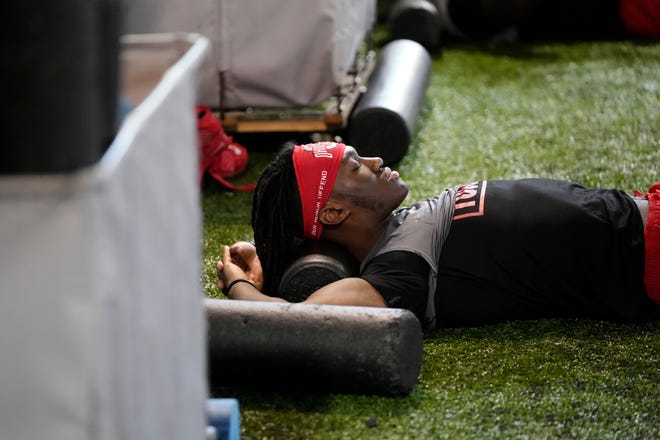Less than 14 months from throwing his first college pass, Arch Manning has created a separate name, image and likeness category for himself — one where it’s not about how much the generational five-star quarterback can earn but whether it’s important to earn anything at all.
It is a category where — at the top of the NIL food chain — football is still the main thing.
Manning, the celebrated Texas commitment, comes from the first family of football, a brand so recognizable that his father Cooper, whose career was cut short due to spinal stenosis, is a bankable star himself. That’s before mentioning grandfather Archie and uncles Peyton and Eli, whose commercial identities have transcended the sport they once played.
“They’re the Kennedys of football,” said Steve Wiltfong, 247Sports director of football recruiting.
Arch Manning’s commitment to Texas on June 23 been a bit lost in the headlines as another round of conference realignment intervened. But the implications of that commitment have not dimmed.
Manning’s future is so promising, so lucrative and so diverse that the father of the next big thing after Manning is already seeking advice.
Dominic Raiola, father of quarterback Dylan Raiola (the No. 1 player in the Class of 2024), has reached out to Cooper Manning to begin assembling a blueprint for navigating football in the NIL era. Dylan committed to Ohio State in May.
“I do like how they do things,” Dominic said of the Mannings. “Long answer, yes, we are keeping track. All the agents calling, right? Drew [Rosenhaus] is calling. [High-profile Athletes First agent] Todd France is calling. CAA is calling.
“I think it’s good to have those conversations. … You want to make sure you’re schooled on it. You don’t want to send your kid off to the Wild West. ‘Here’s a million dollars what do you do with it?’ We want to be prepared.”
In the short one-year history of NIL, Manning is arguably its brightest star. Already, his potential earning power is almost limitless despite being a high schooler.
For the moment, his valuation is $3 million per year — an NIL estimate of what he could be worth — according to Blake Lawrence, CEO of Opendorse, an athlete endorsement company heavily involved in NIL opportunities.
Tennessee prospect Nico Iamaleava has a noted $8 million contract with a Tennessee collective, but the deal is heavily laden with incentives, according to reports.
And his name isn’t Manning. Arch is the All-American gold standard while still at Isidore Newman High School in New Orleans.
“The quarterback at Texas should have the highest NIL earning potential of any position of any sport at any school in the NCAA,” Lawrence told CBS Sports. “Combine that with the name-brand power of being a Manning, and it’s easy to see Arch in a position to earn $3 million or more per year from NIL.”
Enhancing that money-making potential, Manning plays in Louisiana, among the handful of states that allows high school players to earn NIL funds. Despite that, Manning followed the path set by his uncles of their native state. Peyton went to Tennessee, and Eli chose Ole Miss.
“Do what you can to switch Arch to come to LSU, start trashing Texas,” urged Louisiana Sen. Patrick Connick (R), who authored an amendment this year to allow booster access in arranging NIL deals.
The NIL space has developed in fits and starts. The NCAA is still trying to flesh out improper inducements and the schools and boosters who would pay them. NIL marketing agents, some of them already representing NFL stars, are allowed.
Lawrence plans to soon roll out what amounts to an advertising rate card, a one-stop shop that would estimate the cost of athletes’ services.
“What does it cost for Arch to do an appearance?” Lawrence asked hypothetically. “What does it cost for a social media post? What does it cost for him to do an autograph?”
The question remains: Will Arch Manning or his family be interested in any of that? Arch might be at the top of pyramid of those who will control and define NIL, instead of the other way around.
Oklahoma transfer QB Caleb Williams has a batch of NIL opportunities at USC, but the plan is for him to do nothing with those businesses during the season. Raiola is essentially imitating that approach following the Manning model.
Football comes first because the ultimate goal is not hawking a sports drink in college, it is redefining the sport at the next level.
“Athletes like Arch and athletes like [No. 1 overall NBA Draft pick from Duke] Paolo Banchero are forward thinking,” said Jim Cavale, CEO of NIL-centric INFLCR. “What they’re doing is looking at the bigger picture and not taking every deal and spending all their time on NIL because it is work. They’re going to make sure that it fits within the bigger picture of what they want to accomplish.”
Dominic Raiola coaches the offensive line of his son’s Chandler High School team in Arizona. The 14-year NFL veteran from Nebraska calls the temporary gains of NIL “short money.”
“That money is short,” he said. “If you’re not performing and … you want to go the route of performance-based, that’s what this whole thing is. If you’re not performing, who’s to say, ‘OK, we’re done paying you.’ What are you going to do, sue them?”
Dylan Raiola also occupies the tip of that pyramid where players can earn big NIL money even if they don’t necessarily need it. His arrival at Ohio State would continue a conga line of quarterback greats under coach Ryan Day.
At Texas, Manning is already being celebrated as a football savior, perhaps the program’s best quarterback since Colt McCoy led the Longhorns to the 2009 BCS Championship Game. Five-star prospect Quinn Ewers, an Ohio State transfer, would be entering his third year of eligibility when Manning arrives at Texas in 2023.
Not that Manning needs any more pressure heaped on him.
“He’s just trying to get as far as he can,” said Wiltfong, who has spoken with the decidedly low-profile Manning during the recruiting process. “He made a college decision to play for a bunch of coaches he believes in. He wants to be in a cool college town, too. It’s not just football. The next thing is having a great college experience because that’s what you’re supposed to do at that age and period in your life.
“I don’t know what I expected, but the first time I met him, he ate a hot dog for lunch.”
Sounds pretty close to normal. College football could use normal at the moment.
If Manning has any NIL deals, they aren’t known publicly at this time. The 18-year-old rising senior has kept a low off-field profile despite his massive talent on the field. In fact, he announced his commitment with a modest bit of text.
Grandfather Archie provided valuable insight recently at the Manning Passing Academy.
What has emerged after one year of NIL is two types of opportunities: Those that are market driven — social media posts, selling merchandise, working camps, etc. – and those that are athletic-driven with players capitalizing on their ability.
The Arch Manning phenomenon might reveal a third NIL type: None of that other crap matters.
“Football has always been first with the Manning family,” Wiltfong said.




